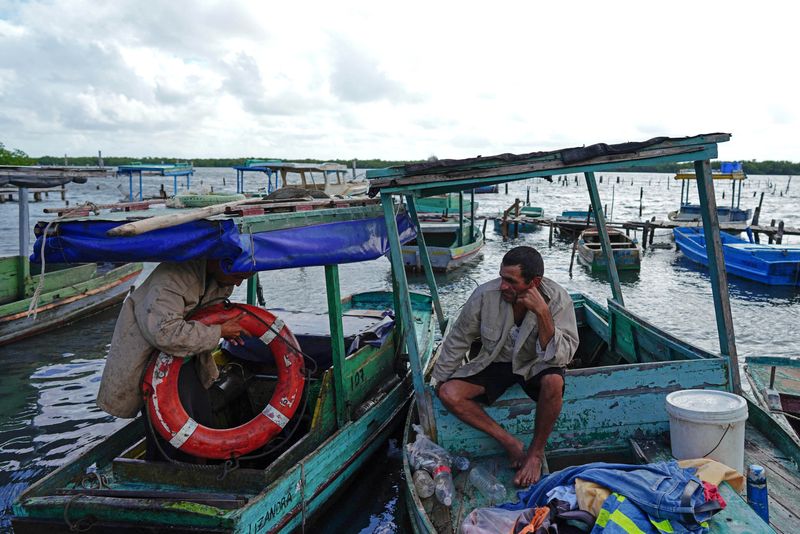By Alexandre Meneghini and Dave Sherwood
ISABELA DE SAGUA, Cuba (Reuters) - At a porchfront coffee stand in the Cuban village of Isabela de Sagua, sunburned fishermen gather at first light to talk of wind, tide and, increasingly, the fine points of U.S. immigration policy.
The latest twist: A U.S. "parole" program announced in early January that allows up to 30,000 migrants from Cuba and some other countries to enter the United States each month provided they apply online, find a financial sponsor and pay airfare.
"Everyone is talking about it," said Carlos Hernandez, a 49-year fisherman. He told Reuters the town was fast losing its population, fleeing the worst economic crisis to hit the country in decades. "People here are desperate to leave."
This far-flung peninsula - on Cuba's north-central coast just 130 miles (210 km) south of the Florida Keys - is poised to once again become a barometer for measuring the impact of U.S. immigration policy, say residents, who for decades have watched the ebb and flow of migrants from the town's sand- and mangrove-lined shores.
Isabela de Sagua long ago became known in Cuba as a jumping-off point for maritime migrants, tempted by its proximity to U.S. territory and rules that were formerly lenient on Cubans who arrived by water.
More recently, an overland route became popular that wound north from Nicaragua through Central America and across Mexico to the U.S. border. Last year, U.S. officials intercepted upwards of a record 220,000 migrants from communist-run Cuba at the U.S. border, according to U.S. Customs and Border Protection (CBP) statistics.
Ana Maria Mederos, 59, who sells cups of coffee for 10 pesos (8 cents) each off her front porch, said Cubans would keep heading north in search of a better life as long as the economy continues to sputter.
"Cubans have made up their minds that you can't live here, and they are going to get out any way they can," she said, adding that she herself had no choice but to stay and care for a sick family member.
"Those who can leave under this new program will, but there are many who won't have the possibility (of sponsorship) and will keep taking their chances by sea, over land, whatever."
The administration of U.S. President Joe Biden has bet otherwise. The 'parole' policy was introduced in parallel with the expansion of a program to speedily expel migrants who enter illegally and in January it said the result had been a 97% drop in migrants arriving at the southwest U.S. border from Cuba and three other countries.
The village residents confirmed that those previously flocking to Nicaragua to head overland had largely changed strategies, many opting instead to try their luck with the parole program. Reuters spoke with several residents, documents in hand, who were seeking to renew passports or prepare a parole application.
However, 20 Republican-controlled U.S. states have already sought to block the parole program through the courts, calling it an "unlawful amnesty program" that will worsen the immigration crisis.
Miguel Negrin, 56, who sells vegetables from a makeshift trailer towed behind his 1958 Dodge, said it was now or never for those looking to migrate legally to the United States.
"Whoever can take advantage of Biden's program better, because it won't last long," he said.
SEA CHANGE
The United States has warned that Cubans taking to the sea from places like Isabela de Sagua and trying to land on U.S. soil could become ineligible for the new parole program.
A spokesperson for the U.S. Coast Guard in Florida told Reuters that the agency had not tabulated the number of Cuban migrants intercepted at sea since the Biden policy announcement on Jan. 5, though the agency has said it repatriated more than 200 Cuban maritime migrants in January.
During the last week of January, fishermen told Reuters at least two separate groups of migrants left Isabela de Sagua by sea. At least one group had been caught and returned to Cuban soil, they said.
One woman, who declined to be interviewed or give her name, said through a crack in her door that she had made a failed attempt by sea and had been returned by U.S. agents.
A Cuban Border Guard boat patrols the bay off the shore of Isabela de Sagua, which is ringed by densely-wooded, mostly uninhabited keys.
Several confiscated rustic boats, hammered out from zinc roofing and with styrofoam inside, now sit behind a chain-link fence guarding the Border Guard's barracks.
There are no official statistics on how many migrants have left Isabela de Sagua, but desolate streets on a recent Saturday morning, lined with shuttered homes and restaurants, hint at the exodus taking place.

Local resident Felix Garcia, 60, retired from the military and disabled with epilepsy, said he and his wife live off 1,500 pesos a month, approximately $12.50 at the official exchange rate. He told Reuters he had not been able to find medicine for his illness in months.
"The parole program works if you have someone to sponsor you. But me? I have no one," he said. "I will probably die here."
